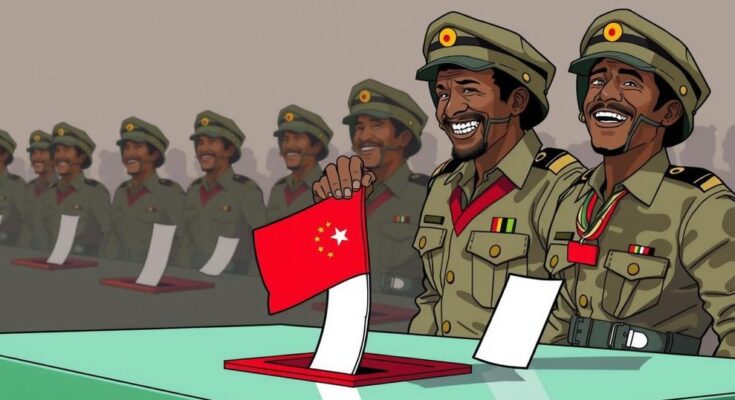Chadians voted in parliamentary elections on Sunday, marking the end of military rule, yet faced low turnout as opposition parties boycotted the process, denouncing it as illegitimate. The elections, the first in over a decade, follow a disputed presidential vote. The main focus remains on preventing the potential loss of democracy during this transitional phase amid persistent internal security challenges.
On Sunday, Chadians participated in parliamentary and regional elections, which marked the conclusion of a three-year interim military governance period. Nevertheless, the primary opposition groups boycotted the election, alleging that the authorities had failed to establish a credible electoral process. This parliamentary election is significant as it represents the first such event in over a decade; it follows a disputed presidential election won by Mahamat Idriss Deby, the military leader who assumed power in 2021 post the death of his father, Idriss Deby Itno, the long-standing president. Voting concluded late Monday, but official results are expected to be announced in approximately two weeks.
Deby commented that these elections would usher in a long-awaited era of decentralization desired by the Chadian populace. However, the nation has yet to see a genuine transfer of power since its independence from France in 1960. The elections also represent a milestone in the Sahel region, being the first to align with promises for a delayed return to democratic governance led by military governments.
According to registered data, over eight million citizens were set to choose 188 members of Chad’s National Assembly along with provincial and municipal representatives. However, voter turnout appeared notably low, particularly in the capital city, N’Djamena, where polling stations were nearly empty. One voter, Mahamat Issa Hissein, expressed hope for a brighter future for Chad following this election.
More than ten opposition parties, including the Transformers party led by Succes Masra, opted out of the electoral process, citing its illegitimacy. Masra, who previously served briefly as prime minister, condemned the activity as a sham designed to prolong Deby’s rule and urged voters to abstain from participating in the elections. This unfolding electoral scenario occurs amid critical security issues in Chad, such as Boko Haram threats and diminished military cooperation with France, an important ally for decades.
Chadian political scientist Mahamat Oumar Adam underscored that the primary concern surrounding the election is preventing the loss of democracy through an interminable transitional phase, which commenced in 2021, including a national dialogue and the constitutional referendum earlier this year. He pointed out that the absence of a credible opposition party undermined the election’s integrity.
The parliamentary elections in Chad serve as a pivotal moment in the nation’s political landscape, marking the end of an interim military rule that commenced following the death of long-serving President Idriss Deby. These elections are the first democratic opportunity in over ten years, reflecting ongoing efforts for a return to constitutional governance. However, opposition boycotts and allegations of electoral malpractice cast a shadow over the legitimacy of the process, emphasizing longstanding political tensions in a country known for its struggles with democracy and governance since gaining independence. The backdrop of rising security challenges and deteriorating relations with historical allies like France adds further complexity to the political environment in which these elections take place.
The recent parliamentary elections in Chad highlight the ongoing struggle for democracy in a nation fraught with political turmoil and opposition dissent. With significant boycott participation by opposition parties and low voter turnout in key areas, concerns regarding the legitimacy of the electoral process persist. While authorities claim the elections will facilitate much-needed political decentralization, the prevailing distrust among citizens points to a challenging road ahead in Chad’s quest for democratic stability.
Original Source: apnews.com




